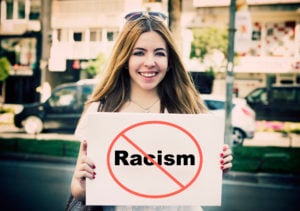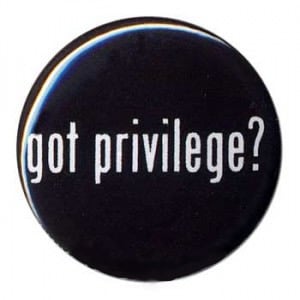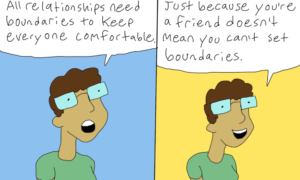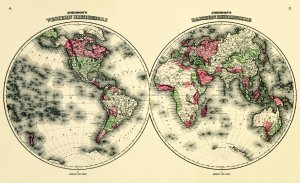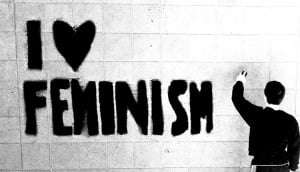
Source: Nation of Change
There’s something wrong with the way that we talk about feminism these days.
And, there’s been a lot of talk.
From Taylor Swift’s realization that she’s, “been taking a feminist stance without actually saying so” to Beyoncé’s “I guess I am a modern day feminist,” celebrities are casually dropping the F-bomb all over the place.
And I’ve noticed in my personal life that people seem to be claiming this identity more and more and convincing others to do the same, saying things like, “Do you think women deserve to have jobs and vote? Congratulations, you’re a feminist!” which is met, generally, with assent.
And, don’t get me wrong: It’s great that many are breaking down the absurd stereotypes about feminists and feminism and coming to embrace the label openly.
But in our efforts to rebrand the term “feminist,” are we so relieved to see people finally presenting feminism without denouncing it on the lines of inaccurate associations and baseless stereotypes that we will accept any basic, conservative definition of it?
Because, I, for one, will not.
I’m over it.
I’m bored with claims that feminism is just the notion that women are people, or merely a belief in equality and nothing more.
And I’m tired of people declaring that they guess they’re feminist, *shrug*.
I mean, I declare with more fortitude that I don’t want onions on my burrito.
And I hate onions, y’all. But I hate the heteropatriarchy more. And I want to fight to change it.
And I’m not really interested in a feminism that doesn’t include a strong, dedicated commitment to doing the same.
I also don’t really understand how you can be a feminist in theory when you live in a sexist world.
If we spend all of our efforts trying to get people to say “Okay, fine, I’m a feminist” and nothing more, then we’re losing sight of the reason we need people to be feminists in the first place.
And the movement could suffer greatly if we continue to get it wrong.
Feminism is not just the belief that women and men deserve social, political, and economic equality.
It is also the understanding that, on all of those levels, in all facets of society, all around the world, they don’t. And it is the commitment to changing this for women and for all groups who are disadvantaged from culturally created, systematic, oppressive reactions to their identities, particularly to their gender identity.
Feminism takes critical thinking to examine what’s wrong with our sexist culture, self-reflection to explore how this has affected us personally, community dialogue to develop and evolve a social consciousness, and action to change oppressive systems on small and large-scale levels.
Feminism. Is. Work.
In fact, even basic definitions of feminism include the words “advocating, defining, understanding, examining, establishing, defending, protecting, challenging, supporting, promoting…” Verbs.
To be feminist is to do feminism, not just to claim it.
And I, for one, am much less concerned about what people are calling themselves and much more concerned about what they’re doing, less concerned with seeing the word “feminist” brightly lit on a stage than I am in having serious conversations about gender, less concerned with the werq than the work (and I werq hard).
I mean, what if we saw other major social issues the same way we see sexism and other forms of kyriarchal oppression?
Would we no longer care about those in West Africa dying from Ebola if doctors committed to being vehemently anti-disease?
Would we believe deforestation was solved if loggers admitted that trees are cool?
Or what if Malcom X had said, “Do you believe Black people are people? Congratulations, you’re now ready to fight for Black liberation?”
Hard no.
Obviously, serious social issues need a considered, widespread, passionate response, and beliefs without action have no place in a social movement.
And yet, we remain willing to accept an inactive feminism.
Perhaps this is mostly because the same social schemas that have taught us for ages that anything female or feminine is inherently passive lead us to more readily see feminism as a passive pursuit. (Ever met a passive Men’s Rights Activist? Me neither.)
Or perhaps it’s more because the issues of women and other oppressed groups have been made so invisible that we don’t even see them anymore and think equality is mostly achieved already and don’t want to hear otherwise.
I don’t know.
But I do know that we have a ton of work to do (see: every article on this site) and that changing oppressive structures and healing from structural abuses is going to take a whole lot of time and effort.
And I know that we’re not a feminist society just because a lot of us say we’re feminists (and, for the record, many people still don’t).
Maybe you think this is all too harsh.
Maybe you want to tell me that I don’t know the internal work people are doing or how other people experience privilege and oppression and that I can’t go around criticizing how other people do feminism, especially since that fits into the historically problematic trend of cis White women defining the movement, and I can’t expect everyone to wake up every morning thinking about queer politics and go to bed every night reading Audre Lorde.
And you’re right.
On all of those counts, you’re right.
No one has the right to define someone else’s feminism or say that another person cannot identify as a feminist just because you don’t see them as such.
But I do think it’s fair to ask someone who comes out as feminist, “How does feminism show up in your life?” or “How do you practice your feminism?”
Because saying “I’m a feminist” is the beginning of a conversation, not the end of one. And it is a conversation that needs to happen.
Otherwise, an identity (and its associated ideology) that was once dismissed because it was seen as being too radical could be dismissed on the grounds of being too simple.
And we don’t need a feminism that’s trendy, but one that’s transformative.
So, please, no more “Duh, feminism” because there’s nothing “duh” about it.
A feminist consciousness can take years to cultivate. And deconstructing attitudes and behaviors, internally and externally, never stops.
So, let’s not minimize what this is all about.
Let’s not allow feminism to be a fad. Phat pants were a fad. The Atkins Diet was a fad.
This is an incredible, diverse collection of amazing individuals engaging in beautiful, empowering, life-affirming work that roots us in our humanity and connects us to each other with the ultimate goal of making the world a better place for everyone.
We woke up like this. Now, let’s get to work.
[do_widget id=”text-101″]
Katy Kreitler is a Clinical Social Worker specializing in youth, gender, and trauma. She holds an MSW from USC and a BA in Psychology and Sociology from USF. She can be found somewhere in San Francisco reading a book, eating a burrito, and side-eyeing humanity.
Search our 3000+ articles!
Read our articles about:
Our online racial justice training
Used by hundreds of universities, non-profits, and businesses.
Click to learn more









